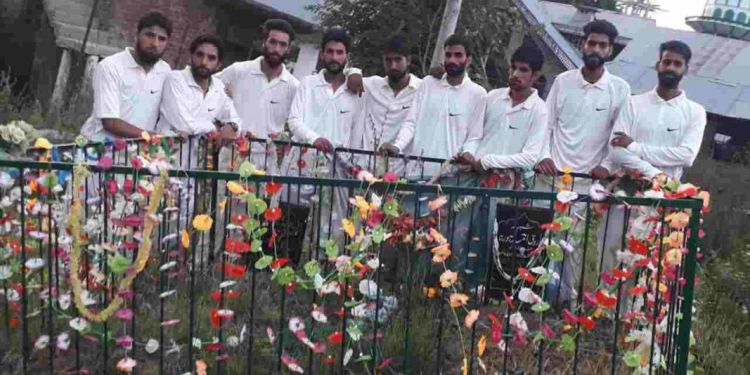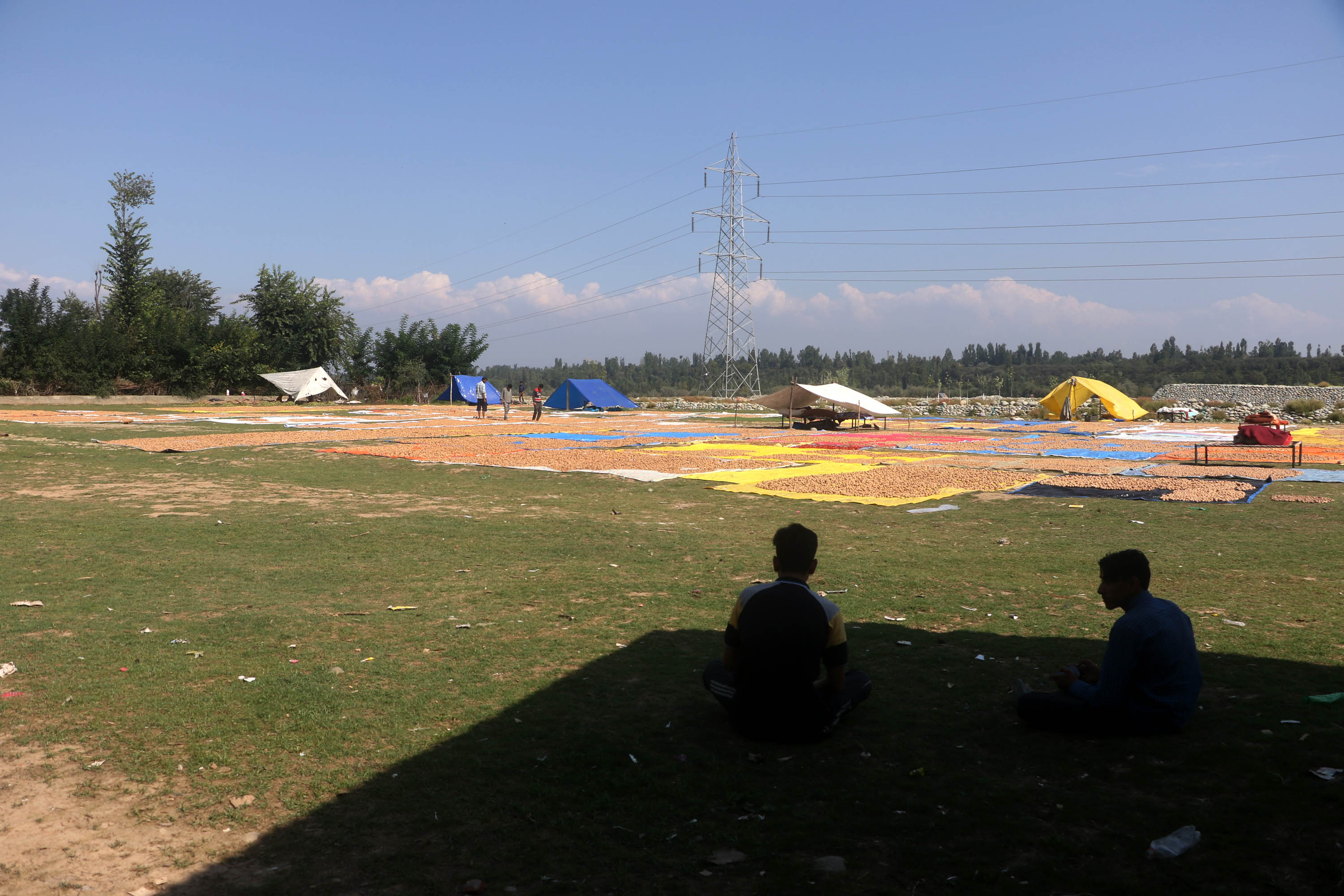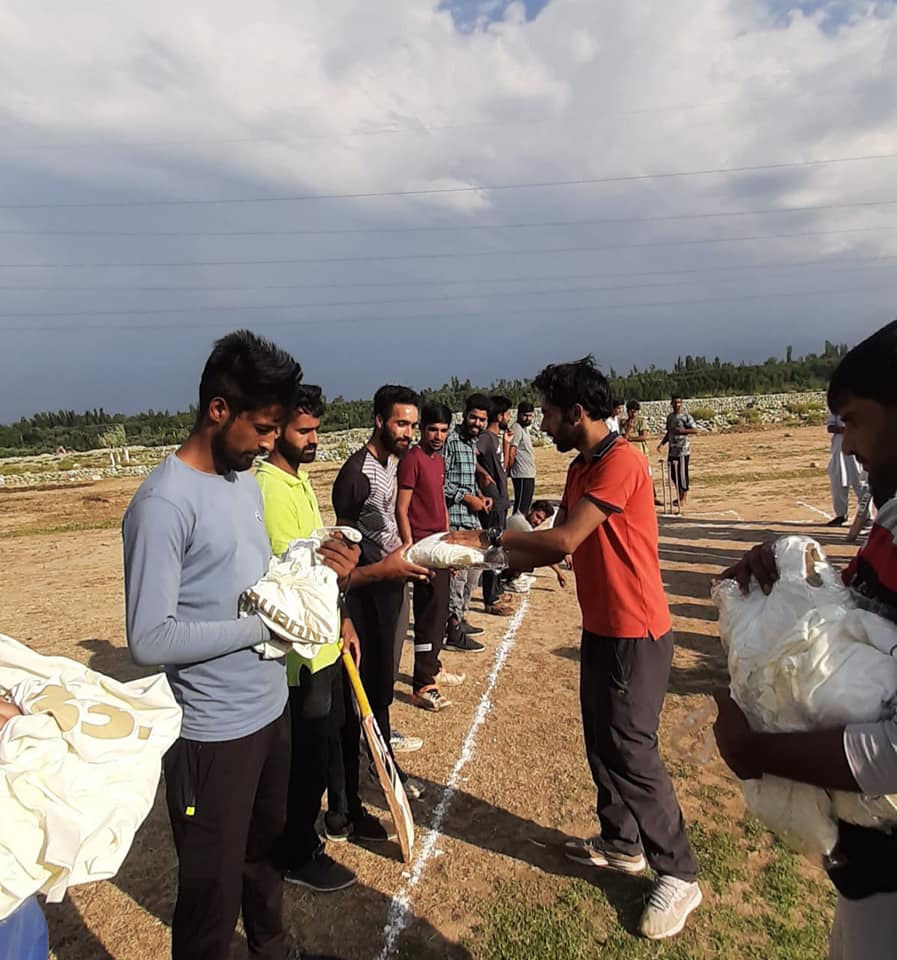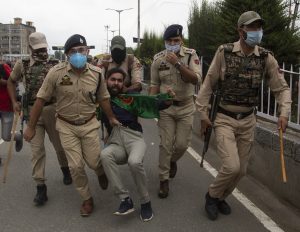The fear is palpable. Until a few weeks ago, the field in Nazneenpora hamlet in the southern district of Indian-administered Kashmir was alive with youth playing cricket. In the first week of August, the cricket ground, which also serves as an Eidgah or prayer ground during Muslim holidays, was swarmed with spectators from nearby villages who had come to witness a “friendly match” organized by a local youth in the memory of his deceased brother – an armed rebel killed in 2019. He even distributed jerseys among the players and some of the spectators too. In the weeks that followed the match, the ground was full of sports activities as usual.
And then came the arrests.
The Jammu and Kashmir Police booked 10 players in the memorial cricket match under the stringent Unlawful Activities (Prevention) Act – more commonly referred to by its acronym UAPA – for, what they called, “glamorizing militancy.” Of the 10 players, nine have been arrested.
Syed Tajamul Imran, who organized the cricket match, has also been put behind bars. The day the match was played, he had written on his Facebook profile – which he has now disabled – that he had organized the match in the “loving memory” of his brother who was “a talented cricketer, admired by his friends for his love for the game and talent he had got.”
After the match was over, the winning side clicked a photograph at the grave of the slain brother of Imran. It somehow surfaced on Facebook weeks later and caught the attention of the police, who charged all of those photographed for glamorizing militancy.
Police maintained that since the match – organized in the name of a militant – attracted a massive crowd, it served the purpose of glorifying the armed rebellion.
Why did the police invoke the UAPA, an anti-terror law, against a group of cricketers? The answer lies in the structure – and complexity – of the law.

The cricketers who were booked under the UAPA pose for a photograph at the organizer Tajamul’s brother’s grave in Nazneenpora, Shopian. Photo by special arrangement.
India’s Main Anti-Terror Law
The UAPA is India’s foremost anti-terror law. The security legislation allows the Indian government to prevent terror-related activities, unlawful associations, and activities that may endanger the sovereignty and integrity of India. With several amendments – the latest being in August 2019 – this legislation has become so stringent that it allows the government to jail for six months, without a trial or bail, anyone they might deem capable of committing a crime in the future.
The legislation, described by many as draconian, is in contrast to the principle of “innocent until proven guilty” as it designates an individual as a “terrorist” – and it is not specified whether the individual can be declared a terrorist at the time of filing a charge or only after conviction in terrorism-related cases.
“It’s a very stringent law. Normally, bail is a rule and jail is an exception for such criminal laws. But it’s quite the opposite in UAPA. You can’t easily get bail in a UAPA case,” says Habeel Iqbal, a lawyer who lives in south Kashmir’s Shopian.
The law facilitates the government to set aside civil liberties and fundamental rights and freedoms and detain or criminalize an individual.
UAPA dilutes the provisions of bail; it also authorizes police to conduct warrantless searches, arrest individuals, and keep them in custody for up to 6 months without formally filing any charges.
One of the primary criticisms of this legislation is that it criminalizes dissent, a particular set of beliefs or opinions that the government might deem unlawful.
In the case of the arrested cricketers, for example, the charges of terrorism stemmed from the fact that they had participated in a cricket match that was being played in the memory of a local youth who had joined Kashmir’s militancy and was killed in a gunfight. Faced with these charges, their chances of getting bail are bleak.
Almost two weeks after the youth were arrested, the cricket ground, which used to be lively all the time, remains swathed in silence. No one from Nazneenpora or adjoining villages dares to play on the field anymore. Having witnessed the fate of those nine young men, the fear is palpable.
Today, the only activity on the playing field is grazing cattle or drying freshly picked walnuts.
The brother of one of the incarcerated youth – who wished not to be named until his brother is released on bail – showed us around the playing field. No one dares to play there anymore, he said, “because, you never know, they might book you for playing there.”
“That’s the intent,” said Khurram Parvez, a human rights activist and chairman of the Jammu and Kashmir Coalition of Civil Societies. “The act terrorizes the society… It’s used to create an atmosphere of fear, an atmosphere of subjugation. Even if the person booked under UAPA is not arrested, the fears looms over the head.”

The playing ground where the match was played is now being used to graze cattle or dry freshly picked walnuts. Photo by Muneeb-ul-Islam.
Rampant Use
Previously, the Jammu and Kashmir administration would arbitrarily invoke the Public Safety Act (PSA), another stringent legislation that allows detention for up to two years without a trial for people above the age of 18. It was rampantly used against people the administration deemed “threat to the nation and law and order.”
But most detentions under the PSA are ultimately overturned by courts, and the provision of the bail is relatively easier, says Iqbal.
“If a person is booked under PSA, he can move the court the very next day to challenge the Act. And in the case of PSA, the hands of the court are not tied by any procedural difficulties. If it feels, it can quash the PSA [invocation] immediately,” Iqbal explains.
To do away with the provisions of bail or any chance of a legal recourse, the UAPA was put in use. The hands of courts are tied in the case of the UAPA. It creates a restriction in granting bail. As a result, it is only in rare cases that bail is granted – on humanitarian grounds, sometimes.
Section 43-D (5) of the UAPA states: “Notwithstanding anything contained in the Code, no person accused of an offense punishable under Chapters IV and VI of this Act shall, if in custody, be released on bail or on his own bond unless the Public Prosecutor has been given an opportunity of being heard on the application for such release…”
“Now armed with a more draconian law” that provides unregulated power to the police, “the government uses it to detain people who are a political threat or dissenting,” says Parvez.
Iqbal argues that the UAPA is used arbitrarily because its intent is to terrorize and it is an easy alternative to the PSA. “It’s rampantly used because instead of invoking several PSAs against an individual, UAPA keeps the person out of circulation for a long time without any chance of bail,” he says.
The provisions of the UAPA are overly broad and vaguely worded, making it a tool to criminalize the exercise of civil liberties. A case in point is an incident from late August this year, when the Jammu and Kashmir Police booked three persons in Srinagar under the UAPA after a video surfaced on social media purportedly showing them chanting pro-freedom slogans during a Muharram procession.
A police spokesperson said they had acted “swiftly” after the video surfaced on social media. In the clip, mourners were found chanting pro-Azadi (freedom) slogans in a Jaloos-e-Aza – a religious procession carried out by Shia Muslims.

Syed Tajamul Imran during the cricket match organized in August in memory of his slain brother in Nazneenpora Shopian. Photo by special arrangement.
Criminalizing Journalism
Before dawn on April 20, Kashmiri photojournalist Masrat Zahra received a message from an acquaintance asking her about her well-being. She thought it was a normal check-in from a friend. But her acquaintance broke the news to her: Zahra had been booked under UAPA and it was all over social media.
Why? The police in its statement said: “Cyber Police Station received information through reliable sources that one Facebook user namely Masrat Zahra is uploading anti-national posts… Facebook user is also believed to be uploading photographs which can provoke the public to disturb law and order. The user is also uploading posts that tantamount to glorify anti-national activities and dent image of law enforcing agencies besides causing disaffection against the country.”
The photographs in question were from Zahra’s documentation of the Kashmir conflict; she used to upload such images on her social media profiles on a regular basis. Notably, Zahra was identified not as a journalist in the FIR but as a “Facebook user.”
When charges against Zahra triggered an uproar on social media and drew widespread condemnation against the Jammu and Kashmir Police, the officer in charge of the Kashmir Cyber Police posted on Twitter a photo that Zahra had uploaded on Instagram in 2018.
The photo showed Shia mourners holding a large portrait of slain militant commander Burhan Wani with a label in Urdu, reading “Shaheed Burhan Wani.” Shaheed translates into martyr; Zahra had duly mentioned that in her caption.
Zahra was booked under Section 13 of the UAPA and Section 505 of the Indian Penal Code (IPC). Until then, Zahra says, she didn’t even know much about the law or its gravity.
Zahra is young in her field and one of the few female photojournalists who are actively documenting life in the Kashmir conflict. Her work has featured in several national and international publications.
Why was she booked in particular? To this recurring question, Zahra has one possible explanation: “I am a young freelance photojournalist and a woman at that. Booking a female journalist is unusual. When I was booked and called to the Cyber Police Station, it sent out a message: We will spare none.”
Zahra said she was booked under this law so as to make an example out of her and so that the rest of the journalists “fall in line” – and most of all, create an atmosphere of fear.
Senior Kashmiri journalist and author Gowhar Geelani was also booked under the UAPA in April.
In a statement, the police said: “Cyber Police Station Kashmir Zone, Srinagar, has received information through reliable sources that an individual namely ‘Gowher Geelani’ is indulging in unlawful activities through his posts and writings on Social Media platform (sic) which are prejudicial to the national integrity, sovereignty and security of India.”
It further added: “The unlawful activities include glorifying terrorism in Kashmir Valley, causing disaffection against the country and causing fear or alarm in the minds of public that may lead to commission of offences against public tranquility and the security of State.”
In Geelani’s case also, the police did not identify him as a journalist but merely “an individual” on social media. The police did not specify which social media posts from Geelani were “glorifying terrorism in Kashmir Valley.”
Echoing what Zahra said, Geelani said the UAPA was invoked with an intent to send a message: “If a senior journalist was not spared, how will others be immune?”
The “stern message,” Geelani explains, serves to act on several dimensions. “It changes you as a person. You feel all the time a sword hanging on your head. There is so much fear that it changes the way you write. And in the process, a lot of stories are killed.”
Both Zahra and Geelani say they now try to be cautious about what they post on social media.
And the UAPA cases against Geelani and Zahra has succeeded in sowing fear among other journalists. Zahra says a photojournalist friend of hers switched his career after her case. “He said if I was not spared in spite of being a woman, how can he be safe? He quit journalism,” Zahra says.
Geelani says the “purpose” of the UAPA against journalists is to make them indulge in self-censorship. At the core of this law, he says, is an intent to control the narratives and criminalize dissent. “The government wants homogeneity of opinion in the society. They want to obliterate the middle ground. Any form of dissent or opinion that does not fit their narrative is criminalized and stifled,” he says.
If you were to describe UAPA, how would you define it?
“Thought Police,” says Geelani promptly.
Qadri Inzamam is a freelance journalist based in Indian-administered Kashmir. His stories have been published in the TRT World, BBC, Al Jazeera, The Diplomat, The New Arab, Caravan, Scroll and several national and local media publications.
Mohammad Haziq is a freelance journalist based in India.
































